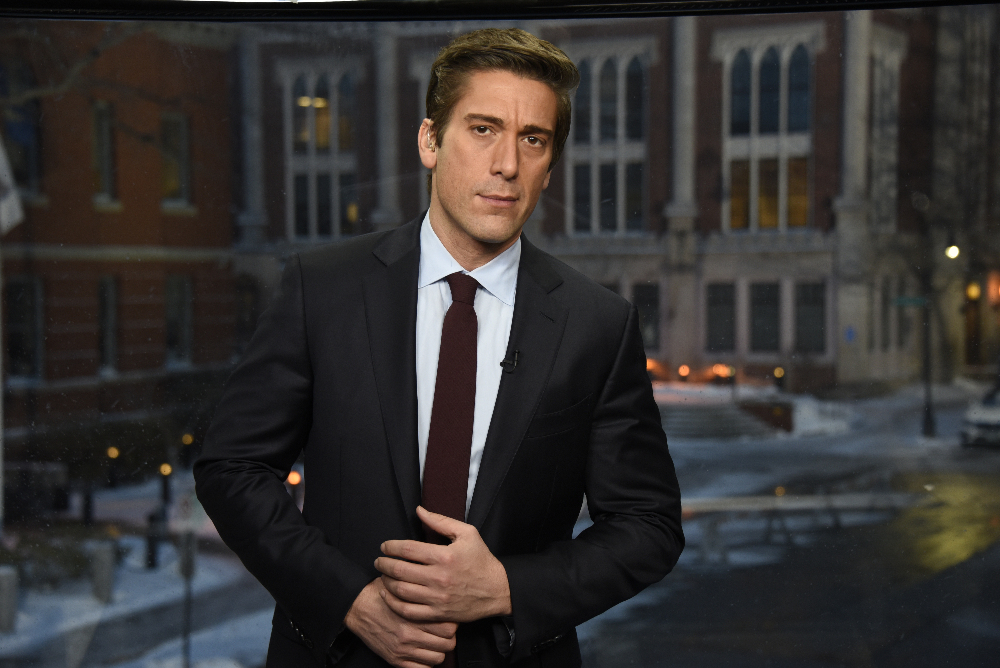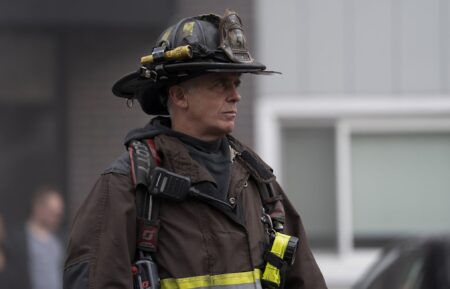Why David Muir Is Tackling Heroin Abuse in America

On the heels of a bipartisan bill to combat the growing epidemic of opioid and heroin abuse passed by the Senate on Thursday, World News Tonight anchor David Muir presents Breaking Point: Heroin in America, which airs this Friday. We touched base with Muir, who took time to tell us why he’s tackling this specific topic.
What does the news special cover?
You’ll hear from parents, young people, addicts and recovering addicts. Some of these families have been documented for over a year. There have been some very difficult turns over that year. We’ll show how the tentacles of heroin takes over a community. You’ll learn that the nurse who becomes the advocate for helping others find treatment nearly lost her own son to a heroin overdose. When a paramedic is called to a scene to save someone from an overdose, we’ll learn that he lost his own son to one. We are reminded throughout the hour that it’s everywhere you look.
Why focus on this special now?
It’s an epidemic that knows no boundaries: Rich, poor, middle class, all ethnic backgrounds and ages. We’ve been documenting this for more than a year and some very brave families have allowed us in with our cameras. In many cases, it started with prescription pain medication for an injury. Once the prescription ends, the easiest thing to find is heroin. It’s cheaper, it’s everywhere and it provides the same opioid fix that the pan medications offers. In many of these cases, the spiral is quick. Hopefully the families and their stories will begin a national conversation about how we’re going to tackle this.
What community does the special touch on and why?
Much of the hour is based in Manchester, New Hampshire, because it’s been hit so hard. Nearly half of the population in New Hampshire knows someone who has abused heroin, and yet it’s the 49th state in the country when it comes to access to treatment. But we go elsewhere, because it’s in small towns across the country.
Is there trouble getting enough money for this problem? New Hampshire, for instance, is pretty libertarian and not big on taxes.
Advocates will tell you that a lack of government action plays an important role and families are sounding the alarm.
You brought up the issue when you and Martha Raddatz moderated debates in New Hampshire. What, if anything, happened?
We asked about heroin during both debates, and I think a lot of these families that we’ve documented felt validated by those questions and acknowledged. [But they were] probably equally as frustrated with how quickly those answers go by because they’ll tell you that they’ve been sounding the alarm for some time now. Especially in New England, candidates have been forced to answer questions about it in town halls.
How bad is the epidemic?
The numbers are staggering. 128 people die every day in this country from drugs, and the vast majority of those deaths are prescription pain pills and heroin; more deaths than guns and car accidents in this country. I think people are seeing it start to pop up in their local newspapers and on their local news. We just hope to get the country talking about it.
Are more rehab facilities becoming available?
The most frustrating part about this emergency for many of these families is the tsunami of need and the wait periods. When you call for help, you can wait weeks if not months for an available bed. If there’s one thing that I’ve learned from this year-long project, it’s that when an addict is ready for help and needs help at drug rehab long island, everyone will tell you that is a crucial moment. If they don’t get the help in that window, they can unravel and quickly.
Some minority groups charge that the abuse is finally taken seriously because so many middle-class white kids are victims. No one cared when it was inner city kids.
I would say that I hope we covered it then, and we’re covering it now because it’s affecting families of all types. I do think what’s different this time is not the people but the route at which this heroin has traveled from prescription pain medication across this country, some say at an alarming rate. People hooked on that opioid high and then, when the pills run out, turn to heroin.
Is it coming over the border from Mexico?
I think drug enforcement agents will tell you a lot of this is coming from Mexico and that the people who are making a lot of money off of this heroin know the communities in America—where they’re most vulnerable, where prescription pain medication has been prescribed. They know the route to New York and straight up 95. It’s straight to Manchester..
Is the drug Narcan helping to cut deaths from overdose if administered quickly?
Yes. Not only do we try to educate the public about Narcan, but there is a moment in the hour when an 11 and 12 year old are being taught how to administer it.
So where’s the hope here?
There’s these incredible people who have seen it in their own family and are determined to make sure they try to stem the tide in whatever way they can. You’ll see how they’re doing it. People want to know what the government is going to do to help. They’re watching their children die. If the beds are weeks and months off and if the government isn’t acting yet, you’ll see people at the end of the hour taking action into their own hands.
What’s the takeaway?
There is an awareness in this country about the danger of over prescribing pain medication, and that is something that we’ve reported on before. I think that this heroin emergency that many say was precipitated by pain medication is something that’s just now getting attention on a national scale.
What’s your next news special?
It will be done in a month or so, and it will take me out of the country.
To a war zone?
I can’t say anymore than that. You’re good.
Breaking Point: Heroin in America, Friday, March 11, 10/9c, ABC
From TV Guide Magazine
'Reasonable Doubt' Boss Teases Season 3 Will Be 'Soapy' & Full of 'Mystery'
Hotshot attorney Jax Stewart bucks the system to defend her clients, protect her family, and crush her enemies in the thrilling third season of Reasonable Doubt. Read the story now on TV Insider.







